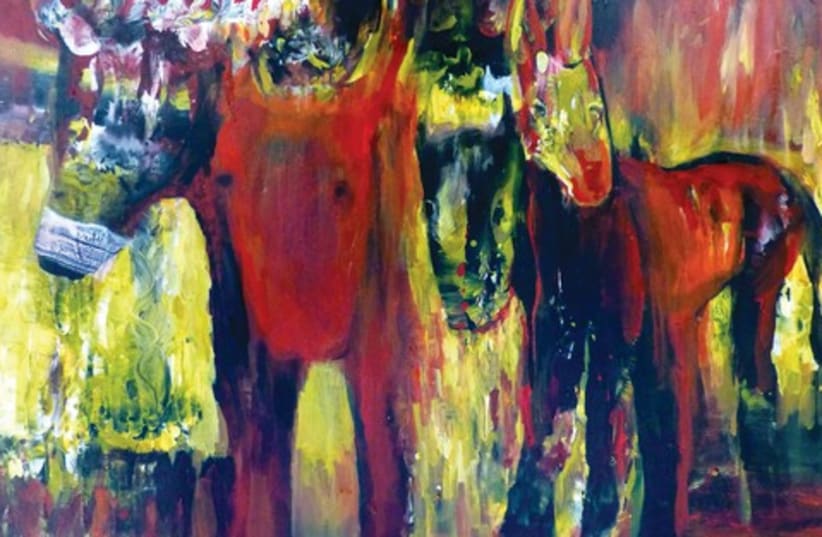In last week’s commentary on the portion of Yitro, we showed how the Covenant at Sinai expressed the Israelites’ commitment to the Jewish religion, to the values, rituals and interpersonal commandments which would transform us into God’s “chosen treasure from amongst all of the nations…, into a Kingdom of priest-teachers and a holy nation” (Exodus 19:5-6). The symbol of this Covenant is blood – the blood of the sacrificial offerings, some of which was sprinkled on the altar (for God), and some upon the nation, with Moses declaring, “Behold, the blood of the Covenant, which the Lord has sealed with you on the basis of all these words” (Ex. 24:8) What is the symbolism of this blood? It is certainly strongly reminiscent of the prior Covenant between God and Abraham, the Covenant between the Pieces, which featured animals cut in half, with Abraham and God (as it were) passing between the blood of the pieces.This covenant guaranteed Abraham’s descendants eternal life as a nation with secure borders for the Land of Israel.Abraham’s covenant and the covenant at Sinai both seem to emphasize a mutual, two-sided contract, between a sovereign Lord and a free nation committed to live in accordance with His commands.
The earlier covenant (Between the Pieces) is also bound up with the covenant of circumcision, which also requires taking some blood from the male organ of propagation at eight days of age. The Bible iterates and reiterates that blood is the very life of the organism.Indeed, the Hebrew term for human being – “Adam” – is built upon the Hebrew word “dam,” blood. It is as though the Bible is teaching that without offering sacrificial blood for the sake of these covenants, there will be no life – not for the Jewish people and not for humanity as a whole. We must be willing to sacrifice blood for our Covenant, and in return we will receive the blood of external life.Rashi, our classical commentator, goes one step further, suggesting that the Sinaitic Covenant of the sprinkling of the blood upon the nation sealed our conversion (giur) to Judaism. Our Sages teach that our ancestors entered into the Jewish Covenant by means of circumcision, ritual immersion and the sprinkling of the blood. At Sinai, we were converted – which explains the necessity of our acceptance of the commandments, “we shall do and we shall internalize.”And as we saw last week, this conversion was a real celebration; the whole burnt and peace offerings of the youth occasioned great joy, as the Bible demands, “on the days of your Rejoicing, and your Festivals and your New Moons you shall blow the bugles over your whole burnt offerings and your peace offerings” (Numbers 10:4). Hence in profound spiritual enjoyment, Moses calls out, “Behold the blood of the Covenant” … and “Moses, Aaron, his sons, and the Seventy Elders go atop the mountains… look upon the Lord, and eat and drink” (Ex. 24:8-11). A conversion is a cause for rejoicing – despite, or because of, the blood sacrifice and of life eternal.Close to three years ago, on my way to the village of Poutti in Uganda, I spent a Shabbat as scholar in residence in the Orthodox school in the Kenyan capital, Nairobi: There was a one African woman who caught my attention, even from the women’s section, because of her ecstatic prayer and her obvious familiarity with the Hebrew chants. When I met with her afterwards, she explained that many decades before a voice from heaven had led her out of the Baptist Church and into an Orthodox synagogue, where the Sabbath – and not Sunday – was kept as the Lord’s Day. She said that all of her children and grandchildren observed the commands of our Holy Bible. The goal of her life was to become Jewish; her name was Wanjiku.As the world – or Divine Providence – turns, Tarfon (an African who studied for one year in our Efrat Yeshiva Hesder Mahanayim and came from Poutti, where several hundred Africans have been following Torah commandments for 100 years) fell in love with Ruth, Wanjiku’s granddaughter; I made a return visit to Poutti to perform their wedding, but first to convert Ruth (who indeed had been living a completely observant life) as well as Wanjiku in the new mikve (ritual bath) which now graces Poutti.For Wanjiku, the ritual immersion was no simple act; she had recently suffered a stroke. Nevertheless, after her immersion, she looked absolutely radiant.She said that she had believed for many decades that her conversion would eventually come, and that this day of her rebirth was the happiest day of her life.When I gave her the new name of Emuna (Faith), she exclaimed the sheheheyanu blessing with tears of joy and choked emotion. My then 14-year-old grandson, Eden, who accompanied me on the trip, whispered, “I always heard how Judaism is an obligation, a yoke of responsibility. I had to come to Africa to learn that Judaism is a joyous privilege and a gift of God.”Shabbat shalom
The writer is the founder and chancellor of Ohr Torah Stone colleges and graduate programs, and chief rabbi of Efrat.
